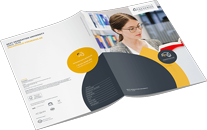Also interesting ...
- Distance learning program
- Master of Arts (M.A.)
- 2 Semester
- online
- German or English
- Human Resource Management I, Human Resource Management II, Employer Branding and Recruiting, Talent Management and Human Resource Development, People Analytics and Big Data, Research Methodology, Semi…
The Master's program in Human Resource Management lasts only 2-4 semesters in full-time study or 4-8 semesters in part-time study, depending on the prerequisites. You will deal with topics such as talent management and personnel development and delve into concepts of industrial and organizational psychology, for example.

 DE
DE  This provider offers free info materials to download or send. Would you like to be redirected to the provider's website? There you will find much more information about the course.
This provider offers free info materials to download or send. Would you like to be redirected to the provider's website? There you will find much more information about the course.
Advisory Service
Have questions about Academic Programs Human Resources? Ask your question here, even anonymously. An employee of the institution FOM University of Applied Sciences or the editorial team will answer you.
or post as a guest